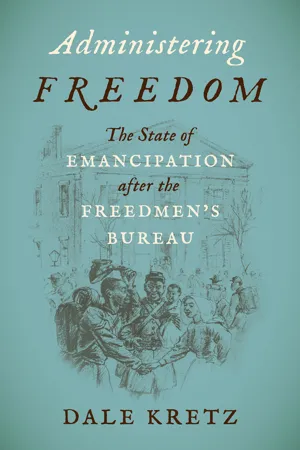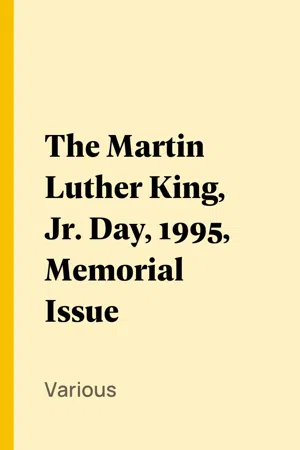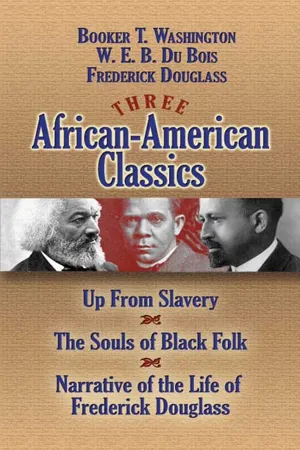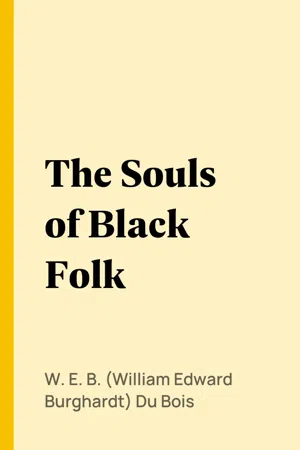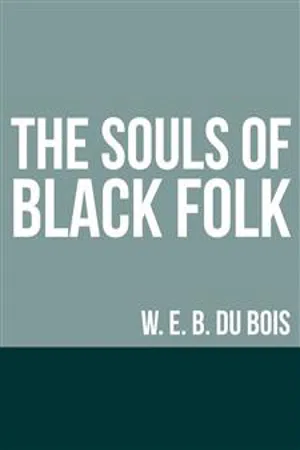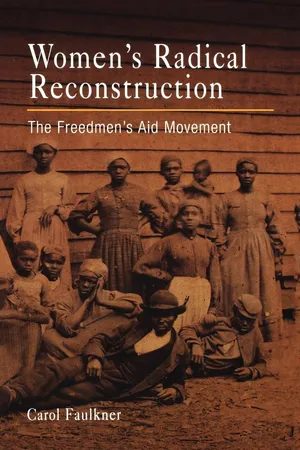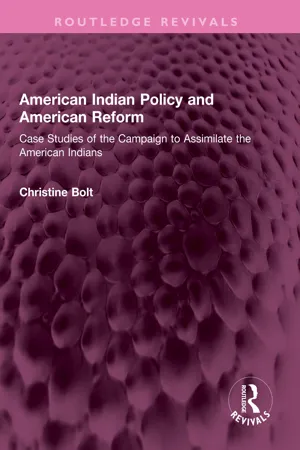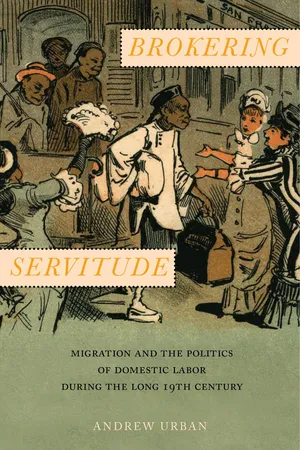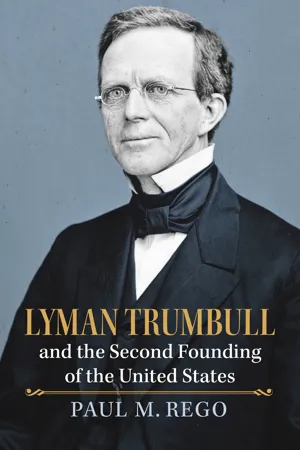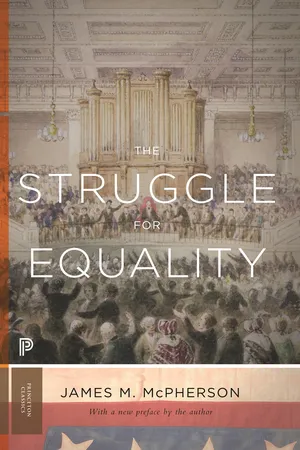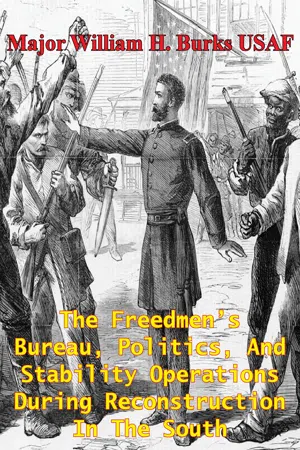History
The Freedmen's Bureau
The Freedmen's Bureau was a U.S. government agency established in 1865 to aid newly freed African Americans in the aftermath of the Civil War. It provided food, housing, medical care, and education, and also helped reunite families. The bureau played a crucial role in the transition from slavery to freedom for millions of African Americans.
Written by Perlego with AI-assistance
Related key terms
12 Key excerpts on "The Freedmen's Bureau"
- eBook - ePub
Administering Freedom
The State of Emancipation after the Freedmen's Bureau
- Dale Kretz(Author)
- 2022(Publication Date)
- The University of North Carolina Press(Publisher)
Its short tenure betrayed a monumental task, one that had vexed, stymied, and countermanded the antislavery cause for generations, that of orchestrating the transition from slavery to freedom. Freedmen’s Bureau officials held varied responsibilities, from administering material aid through medical treatment and rations to mediating labor contracts and creating and staffing schools. To its officials in outposts across the South also fell the task of reporting on daily “outrages” perpetrated against freedpeople, often pleading for military assistance, often waiting in vain. Over time the bureau would exasperate and disappoint freedpeople as often as it would serve and empower. Perpetually understaffed, the poorly coordinated administrative structure and overlapping or ill-defined jurisdiction also hampered the bureau’s functioning. All of these factors ensured that the agency would execute its duties idiosyncratically at best across the 750,000 square miles of the occupied South, frustrating the ambitions of its agents and officials, including its commissioner, Oliver Otis Howard, but most of all its “clients.” Nevertheless, the creation of the Freedmen’s Bureau marked a significant departure in the story of American citizenship, initiating as it did a more direct relationship between the U.S. government and its citizens, made all the more striking by the fact that the agency’s principal beneficiaries had been enslaved just months prior—and in March 1865, many still were. For those freedpeople who enjoyed proximity to these custodians of freedom, the once imaginary connection to a distant ruler or government collapsed and coalesced in the Freedmen’s Bureau official, embodying if not essentially becoming “the government.” 23 As implied by its official title, the Bureau of Refugees, Freedmen, and Abandoned Lands would provide relief to all needy Southerners devastated by the war, white and Black alike - (Author)
- 2008(Publication Date)
- Perlego(Publisher)
Evidently, Congress must soon legislate again on the hastily organized Bureau, which had so quickly grown into wide significance and vast possibilities. An institution such as that was well-nigh as difficult to end as to begin. Early in 1866 Congress took up the matter, when Senator Trumbull, of Illinois, introduced a bill to extend the Bureau and enlarge its powers. This measure received, at the hands of Congress, far more thorough discussion and attention than its predecessor. The war cloud had thinned enough to allow a clearer conception of the work of emancipation. The champions of the bill argued that the strengthening of The Freedmen's Bureau was still a military necessity; that it was needed for the proper carrying out of the Thirteenth Amendment, and was a work of sheer justice to the ex-slave, at a trifling cost to the government. The opponents of the measure declared that the war was over, and the necessity for war measures past; that the Bureau, by reason of its extraordinary powers, was clearly unconstitutional in time of peace, and was destined to irritate the South and pauperize the freedmen, at a final cost of possibly hundreds of millions. Two of these arguments were unanswered, and indeed unanswerable: the one that the extraordinary powers of the Bureau threatened the civil rights of all citizens; and the other that the government must have power to do what manifestly must be done, and that present abandonment of the freedmen meant their practical enslavement. The bill which finally passed enlarged and made permanent The Freedmen's Bureau. It was promptly vetoed by President Johnson, as "unconstitutional," "unnecessary," and "extrajudicial," and failed of passage over the veto. Meantime, however, the breach between Congress and the President began to broaden, and a modified form of the lost bill was finally passed over the President's second veto, July 16.The act of 1866 gave The Freedmen's Bureau its final form,—the form by which it will be known to posterity and judged of men. It extended the existence of the Bureau to July, 1868; it authorized additional assistant commissioners, the retention of army officers mustered out of regular service, the sale of certain forfeited lands to freedmen on nominal terms, the sale of Confederate public property for Negro schools, and a wider field of judicial interpretation and cognizance. The government of the un-reconstructed South was thus put very largely in the hands of The Freedmen's Bureau, especially as in many cases the departmental military commander was now made also assistant commissioner. It was thus that The Freedmen's Bureau became a full-fledged government of men. It made laws, executed them and interpreted them; it laid and collected taxes, defined and punished crime, maintained and used military force, and dictated such measures as it thought necessary and proper for the accomplishment of its varied ends. Naturally, all these powers were not exercised continuously nor to their fullest extent; and yet, as General Howard has said, "scarcely any subject that has to be legislated upon in civil society failed, at one time or another, to demand the action of this singular Bureau."- eBook - ePub
Three African-American Classics
Up from Slavery, The Souls of Black Folk and Narrative of the Life of Frederick Douglass
- W. E. B. Du Bois, Frederick Douglass, Booker T. Washington(Authors)
- 2012(Publication Date)
- Dover Publications(Publisher)
Evidently, Congress must soon legislate again on the hastily organized Bureau, which had so quickly grown into wide significance and vast possibilities. An institution such as that was well-nigh as difficult to end as to begin. Early in 1866 Congress took up the matter, when Senator Trumbull, of Illinois, introduced a bill to extend the Bureau and enlarge its powers. This measure received, at the hands of Congress, far more thorough discussion and attention than its predecessor. The war cloud had thinned enough to allow a clearer conception of the work of Emancipation. The champions of the bill argued that the strengthening of the Freedmen’s Bureau was still a military necessity; that it was needed for the proper carrying out of the Thirteenth Amendment, and was a work of sheer justice to the ex-slave, at a trifling cost to the government. The opponents of the measure declared that the war was over, and the necessity for war measures past; that the Bureau, by reason of its extraordinary powers, was clearly unconstitutional in time of peace, and was destined to irritate the South and pauperize the freedmen, at a final cost of possibly hundreds of millions. These two arguments were unanswered, and indeed unanswerable: the one that the extraordinary powers of the Bureau threatened the civil rights of all citizens; and the other that the government must have power to do what manifestly must be done, and that present abandonment of the freedmen meant their practical re-enslavement. The bill which finally passed enlarged and made permanent the Freedmen’s Bureau. It was promptly vetoed by President Johnson as “unconstitutional,” “unnecessary,” and “extrajudicial,” and failed of passage over the veto. Meantime, however, the breach between Congress and the President began to broaden, and a modified form of the lost bill was finally passed over the President’s second veto, July 16.The act of 1866 gave the Freedmen’s Bureau its final form, — the form by which it will be known to posterity and judged of men. It extended the existence of the Bureau to July, 1868; it authorized additional assistant commissioners, the retention of army officers mustered out of regular service, the sale of certain forfeited lands to freedmen on nominal terms, the sale of Confederate public property for Negro schools, and a wider field of judicial interpretation and cognizance. The government of the unreconstructed South was thus put very largely in the hands of the Freedmen’s Bureau, especially as in many cases the departmental military commander was now made also assistant commissioner. It was thus that the Freedmen’s Bureau became a full-fledged government of men. It made laws, executed them and interpreted them; it laid and collected taxes, defined and punished crime, maintained and used military force, and dictated such measures as it thought necessary and proper for the accomplishment of its varied ends. Naturally, all these powers were not exercised continuously nor to their fullest extent; and yet, as General Howard has said, “scarcely any subject that has to be legislated upon in civil society failed, at one time or another, to demand the action of this singular Bureau.”To understand and criticise intelligently so vast a work, one must not forget an instant the drift of things in the later sixties. Lee had surrendered, Lincoln was dead, and Johnson and Congress were at loggerheads; the Thirteenth Amendment was adopted, the Fourteenth pending, and the Fifteenth declared in force in 1870. Guerrilla raiding, the ever-present flickering after-flame of war, was spending its force against the Negroes, and all the Southern land was awakening as from some wild dream to poverty and social revolution. In a time of perfect calm, amid willing neighbors and streaming wealth, the social uplifting of four million slaves to an assured and self-sustaining place in the body politic and economic would have been a herculean task; but when to the inherent difficulties of so delicate and nice a social operation were added the spite and hate of conflict, the hell of war; when suspicion and cruelty were rife, and gaunt Hunger wept beside Bereavement, — in such a case, the work of any instrument of social regeneration was in large part foredoomed to failure. The very name of the Bureau stood for a thing in the South which for two centuries and better men had refused even to argue, — that life amid free Negroes was simply unthinkable, the maddest of experiments. - eBook - ePub
- W. E. B. (William Edward Burghardt) Du Bois(Author)
- 1996(Publication Date)
- Perlego(Publisher)
Evidently, Congress must soon legislate again on the hastily organized Bureau, which had so quickly grown into wide significance and vast possibilities. An institution such as that was well-nigh as difficult to end as to begin. Early in 1866 Congress took up the matter, when Senator Trumbull, of Illinois, introduced a bill to extend the Bureau and enlarge its powers. This measure received, at the hands of Congress, far more thorough discussion and attention than its predecessor. The war cloud had thinned enough to allow a clearer conception of the work of Emancipation. The champions of the bill argued that the strengthening of the Freedmen’s Bureau was still a military necessity; that it was needed for the proper carrying out of the Thirteenth Amendment, and was a work of sheer justice to the ex-slave, at a trifling cost to the government. The opponents of the measure declared that the war was over, and the necessity for war measures past; that the Bureau, by reason of its extraordinary powers, was clearly unconstitutional in time of peace, and was destined to irritate the South and pauperize the freedmen, at a final cost of possibly hundreds of millions. These two arguments were unanswered, and indeed unanswerable: the one that the extraordinary powers of the Bureau threatened the civil rights of all citizens; and the other that the government must have power to do what manifestly must be done, and that present abandonment of the freedmen meant their practical reenslavement. The bill which finally passed enlarged and made permanent the Freedmen’s Bureau. It was promptly vetoed by President Johnson as “unconstitutional,” “unnecessary,” and “extrajudicial,” and failed of passage over the veto. Meantime, however, the breach between Congress and the President began to broaden, and a modified form of the lost bill was finally passed over the President’s second veto, July 16.The act of 1866 gave the Freedmen’s Bureau its final form,—the form by which it will be known to posterity and judged of men. It extended the existence of the Bureau to July, 1868; it authorized additional assistant commissioners, the retention of army officers mustered out of regular service, the sale of certain forfeited lands to freedmen on nominal terms, the sale of Confederate public property for Negro schools, and a wider field of judicial interpretation and cognizance. The government of the unreconstructed South was thus put very largely in the hands of the Freedmen’s Bureau, especially as in many cases the departmental military commander was now made also assistant commissioner. It was thus that the Freedmen’s Bureau became a full-fledged government of men. It made laws, executed them and interpreted them; it laid and collected taxes, defined and punished crime, maintained and used military force, and dictated such measures as it thought necessary and proper for the accomplishment of its varied ends. Naturally, all these powers were not exercised continuously nor to their fullest extent; and yet, as General Howard has said, “scarcely any subject that has to be legislated upon in civil society failed, at one time or another, to demand the action of this singular Bureau.”To understand and criticise intelligently so vast a work, one must not forget an instant the drift of things in the later sixties. Lee had surrendered, Lincoln was dead, and Johnson and Congress were at loggerheads; the Thirteenth Amendment was adopted, the Fourteenth pending, and the Fifteenth declared in force in 1870. Guerrilla raiding, the ever-present flickering after-flame of war, was spending its forces against the Negroes, and all the Southern land was awakening as from some wild dream to poverty and social revolution. In a time of perfect calm, amid willing neighbors and streaming wealth, the social uplifting of four million slaves to an assured and self-sustaining place in the body politic and economic would have been a herculean task; but when to the inherent difficulties of so delicate and nice a social operation were added the spite and hate of conflict, the hell of war; when suspicion and cruelty were rife, and gaunt Hunger wept beside Bereavement,—in such a case, the work of any instrument of social regeneration was in large part foredoomed to failure. The very name of the Bureau stood for a thing in the South which for two centuries and better men had refused even to argue,—that life amid free Negroes was simply unthinkable, the maddest of experiments. - eBook - ePub
- W. E. B. Du Bois(Author)
- 2018(Publication Date)
- Youcanprint(Publisher)
Thus it is doubly difficult to write of this period calmly, sointense was the feeling, so mighty the human passions that swayedand blinded men. Amid it all, two figures ever stand to typify thatday to coming ages,—the one, a gray-haired gentleman, whosefathers had quit themselves like men, whose sons lay in namelessgraves; who bowed to the evil of slavery because its abolitionthreatened untold ill to all; who stood at last, in the evening oflife, a blighted, ruined form, with hate in his eyes;—and theother, a form hovering dark and mother-like, her awful face blackwith the mists of centuries, had aforetime quailed at that whitemaster's command, had bent in love over the cradles of his sons anddaughters, and closed in death the sunken eyes of hiswife,—aye, too, at his behest had laid herself low to hislust, and borne a tawny man-child to the world, only to see herdark boy's limbs scattered to the winds by midnight maraudersriding after "damned Niggers." These were the saddest sights ofthat woful day; and no man clasped the hands of these two passingfigures of the present-past; but, hating, they went to their longhome, and, hating, their children's children live today.Here, then, was the field of work for The Freedmen's Bureau; andsince, with some hesitation, it was continued by the act of 1868until 1869, let us look upon four years of its work as a whole.There were, in 1868, nine hundred Bureau officials scattered fromWashington to Texas, ruling, directly and indirectly, many millionsof men. The deeds of these rulers fall mainly under seven heads:the relief of physical suffering, the overseeing of the beginningsof free labor, the buying and selling of land, the establishment ofschools, the paying of bounties, the administration of justice, andthe financiering of all these activities.Up to June, 1869, over half a million patients had been treatedby Bureau physicians and surgeons, and sixty hospitals and asylumshad been in operation. In fifty months twenty-one million freerations were distributed at a cost of over four million dollars.Next came the difficult question of labor. First, thirty thousandblack men were transported from the refuges and relief stationsback to the farms, back to the critical trial of a new way ofworking. Plain instructions went out from Washington: the laborersmust be free to choose their employers, no fixed rate of wages wasprescribed, and there was to be no peonage or forced labor. So far,so good; but where local agents differed toto caelo in capacity andcharacter, where the personnel was continually changing, theoutcome was necessarily varied. The largest element of success layin the fact that the majority of the freedmen were willing, eveneager, to work. So labor contracts were written,—fiftythousand in a single State,—laborers advised, wagesguaranteed, and employers supplied. In truth, the organizationbecame a vast labor bureau,—not perfect, indeed, notablydefective here and there, but on the whole successful beyond thedreams of thoughtful men. The two great obstacles which confrontedthe officials were the tyrant and the idler,—the slaveholderwho was determined to perpetuate slavery under another name; and,the freedman who regarded freedom as perpetual rest,—theDevil and the Deep Sea. - eBook - ePub
- W. E. B. Du Bois, Eugene F. Provenzo(Authors)
- 2015(Publication Date)
- Routledge(Publisher)
28 The opponents of the measure declared that the war was over, and the necessity for war measures past; that the Bureau, by reason of its extraordinary powers, was clearly unconstitutional in time of peace, and was destined to irritate the South and pauperize the freedmen, at a final cost of possibly hundreds of millions. These two arguments were unanswered, and indeed unanswerable: the one that the extraordinary powers of the Bureau threatened the civil rights of all citizens; and the other that the government must have power to do what manifestly must be done, and that present abandonment of the freedmen meant their practical re-enslavement. The bill which finally passed enlarged and made permanent the Freedmen’s Bureau. It was promptly vetoed by President Johnson as “unconstitutional,” “unnecessary,” and “extrajudicial,” and failed of passage over the veto. Meantime, however, the breach between Congress and the President began to broaden, and a modified form of the lost bill was finally passed over the President’s second veto, July 16.The act of 1866 gave the Freedmen’s Bureau its final form,—the form by which it will be known to posterity and judged of men. It extended the existence of the Bureau to July 1868; it authorized additional assistant commissioners, the retention of army officers mustered out of regular service, the sale of certain forfeited lands to freedmen on nominal terms, the sale of Confederate public property for Negro schools, and a wider field of judicial interpretation and cognizance. The government of the unreconstructed South was thus put very largely in the hands of the Freedmen’s Bureau, especially as in many cases the departmental military commander was now made also assistant commissioner. It was thus that the Freedmen’s Bureau became a full-fledged government of men. It made laws, executed them and interpreted them; it laid and collected taxes, defined and punished crime, maintained and used military force, and dictated such measures as it thought necessary and proper for the accomplishment of its varied ends. Naturally, all these powers were not exercised continuously nor to their fullest extent; and yet, as General Howard has said, “scarcely any subject that has to be legislated upon in civil society failed, at one time or another, to demand the action of this singular Bureau.”“All ages in class at primary school for Freedmen,” Harper’s Weekly , June 23, 1866, p. 392.To understand and criticise intelligently so vast a work, one must not forget an instant the drift of things in the later sixties. Lee had surrendered, Lincoln was dead, and Johnson and Congress were at loggerheads; the Thirteenth Amendment was adopted, the Fourteenth pending, and the Fifteenth declared in force in 1870.29 - eBook - ePub
Women's Radical Reconstruction
The Freedmen's Aid Movement
- Carol Faulkner(Author)
- 2013(Publication Date)
- University of Pennsylvania Press(Publisher)
Chapter 5The Freedmen’s Bureau and Material Aid
Like African American women, white abolitionist-feminists rebutted notions of black idleness and dependency in order to convince Reconstruction policymakers to grant greater material aid to former slaves. In Washington, D.C., abolitionist-feminists sought work as agents of the Freedmen’s Bureau, responsible for visiting freedpeople in their homes and distributing rations and fuel. Though female agents endorsed the ideal of independence, they also publicized the extreme poverty of former slaves and requested government and Northern assistance. They resolved this paradox by expanding the definition of the deserving poor to include women with children, the families of Union soldiers, the elderly, and the sick.1 Demanding an enduring institution to alleviate the poverty of the most needy freedpeople, these abolitionist-feminists envisioned a radical Freedmen’s Bureau, far different from the temporary agency promoted by Republican politicians, the military, and the American Freedmen’s Union Commission.In 1865, few Americans supported a permanent agency to assist former slaves. The American Freedmen’s Inquiry Commission recommended only a temporary guardianship, and most Northern whites hoped former slaves would immediately enter into the free workforce and become self-supporting wage laborers. In his autobiography, General O. O. Howard, commissioner of the Freedmen’s Bureau, explained the tenuous political situation of his agency. He wrote, “From the start I felt sure that the relief offered by the Bureau to the refugees and freedmen through the different channels, being abnormal to our system of Government, would be but temporary.” Howard’s distaste for federal intervention framed the life of the Freedmen’s Bureau. In his view, the bureau was a political anomaly, not fully supported by even its Republican friends.2 - eBook - ePub
American Indian Policy and American Reform
Case Studies of the Campaign to Assimilate the American Indians
- Christine Bolt(Author)
- 2023(Publication Date)
- Routledge(Publisher)
In the case of blacks and Indians alike, humane whites faced the question: how were the races to live amicably together? Although expansion into new territory might have been justified as a way of extending American freedom, many Americans, dedicated to a continent dominated by the white race, would not have objected to the extermination of the Indian population within this territory. Both Indians and blacks suffered from the conviction of a majority of whites that the minority commitment to racial equality was sustained only by emotion and flew in the face of the facts of national life. That economic progress which had been marked since the 1830s and which resumed in a spectacular fashion after 1865, sharpened the contrasts between the material circumstances of the three races, while in an increasingly democratic and changing country it was comforting for whites to believe in the fixed racial superiority of all their number. The importance of the nation's 'Anglo-Saxon' roots and tradition was emphasized and immigrant groups as well as racial minorities were coerced into conformity with that tradition. The confusion of race and culture, the rudimentary state of anthropology and the arrogance bred by domestic and foreign policy successes had likewise encouraged the growth of racism by the 1860s. Under such circumstances, the admittedly imperfect Bureau of Indian Affairs and The Freedmen's Bureau (established in March 1865) offer welcome evidence of continuing white concern for minorities.There are, of course, obvious differences between the two bureaux. Employees of the freedmen's agency, unlike the Indian agents, were not in a position to make a sustained profit from their positions. Contemporary hostility towards the short-lived Freedmen's Bureau was greater than that shown to the more isolated representatives of the Indian office.9 The institution offended against the still strong states rights sentiment of the South and alarmed rural employers by drawing blacks to the towns, where bureau offices were located; it appeared to say to southerners that the past was dead and to promise them a future that they did not want. Its use of military men in a region recovering from war, whose white population felt well able to defend themselves against blacks, was more controversial than troop deployment in western territories, to which the army brought valued business and protection against warlike Indian tribes. If the association of The Freedmen's Bureau with radical Republicans turned the debate about its performance into a violently partisan affair, the parties rather routinely took turns to lambast the Indian Bureau, depending on whether they were in or out of power. Indian agents were likely to be engaged in showing tribesmen how to farm on their own account, while the agents of The Freedmen's Bureau, under President Johnson at least, set the ex-slaves to work for others. Furthermore, Indian service officials at this time struggled to carry out their duties despite lawlessness which they were powerless to check, whereas in the South, as conservative whites quickly showed, the law could be used in numerous ways to 'redefine class and property relations and enhance labor discipline'.10 - eBook - ePub
Brokering Servitude
Migration and the Politics of Domestic Labor during the Long Nineteenth Century
- Andrew Urban(Author)
- 2017(Publication Date)
- NYU Press(Publisher)
The bureau’s willingness to naturalize wage labor as the sine qua non of postwar liberalism moved the Republican Party further away from the “free soil” mantle that had been a crucial component of the party’s ideology in the decade leading up to the conflict. 51 Despite the attempts of Radical Republicans in Congress to create a Freedmen’s Bureau bill that would have extended measures for Confederate land confiscation and redistribution to freed black men—a version of the famous “Forty Acres and a Mule” provision that General William Tecumseh Sherman implemented on a more local basis in the Sea Islands region of Georgia—these efforts were blocked by President Andrew Johnson and other opponents who argued that such a policy was too generous in the entitlements it proposed meting out. From the very beginning of the war, black newspapers, such as the New York–based Anglo African, lobbied for policies that made land confiscation and redistribution the basis for Reconstruction. 52 When Congress did pass the Southern Homestead Act in 1866, it allocated only the poorest lands to black settlers and was underfunded and lacking in enforcement. Even so, it was still met with fierce resistance by local whites. 53 In the absence of policies empowering blacks as autonomous economic producers and landowners, markets and wage work were the means by which the bureau governed freed persons as economic actors. It is ironic though that Howard, in his December 1865 report to Congress, would propose having the Freedmen’s Bureau’s agents “adopt a system like the ordinary intelligence office” to “procure good places” for freedmen and women unable to find work. As a member of the middle class Howard would have been all too aware of the scorn these institutions generated, and the lack of confidence that they inspired among employers. 54 Northern employers blamed intelligence offices for corrupting the principles of a free market rather than assisting in their realization - Paul Rego(Author)
- 2022(Publication Date)
- University Press of Kansas(Publisher)
1866 , while simultaneously preparing his civil rights bill, Trumbull drafted and advanced legislation to extend the life and the authority of the Freedmen’s Bureau. In addition to protecting the right of former slaves to sell their labor and arbitrating contractual disputes between freedmen and their employers, the Freedmen’s Bureau furnished food, clothing, medicine, transportation, schools, and even land to former slaves and loyal refugees. Critics charged that caring for the sick and indigent was not a federal responsibility, and that the widespread distribution of land violated individualism and traditional private property rights. But Trumbull responded that the war had not ended, and that the federal government could exercise powers during a state of war that were impermissible in peacetime. He did not regard the Freedmen’s Bureau as a first step in establishing a social welfare state. Initially, he did not even view it as the first stage of Congressional Reconstruction. As far as Trumbull was concerned, the Freedmen’s Bureau was a temporary means of dealing with the unprecedented consequences of war and emancipation. Its life would be brief and of no threat to the traditional powers of the states, especially if permanent homesteads could be secured for the freedmen. Trumbull believed that, in leasing and selling land to the African American men and women who had enriched it with their labor, the Freedmen’s Bureau was helping the former slaves to gain not only property but also personal independence. In this way, he reasoned, his effort to revolutionize land ownership throughout the former Confederacy, which began with the Second Confiscation Act, was perfectly consistent with his—and the founders’—professed commitment to the principles of individual liberty, private property rights, and limited government.The Persistence of Southern DefianceIn the aftermath of the Civil War, the rebels largely accepted their defeat, but this did not mean that they renounced the Confederate cause. In fact, they continued to believe in the righteousness of both secession and slavery, and their hatred of northerners, Union soldiers, southern Unionists, and African Americans remained deep-seated and ferocious. Most were willing to take loyalty oaths in exchange for either general amnesty or an individual presidential pardon, but this was not indicative of contrition. It was, rather, a practical and calculated attempt to protect their property, to avoid political disenfranchisement, and to forestall any attempt to reconstruct the South. Even before the withdrawal of federal troops, southern voters, operating under Presidential Reconstruction, elected to both state and national office the civil and military leaders of the rebellion. The only Unionists who had any hope of election were those who had initially opposed, but ultimately relented to, secession. President Johnson’s lenient approach to Reconstruction encouraged this impudence, and it was not long before former rebels, who had initially resigned themselves to harsh punishment, including the confiscation of property and disenfranchisement, were demanding political power, the return of their property, compensation for lost property (including slaves), and federal assumption of the Confederate war debt.- eBook - ePub
Princeton Classics
Abolitionists and the Negro in the Civil War and Reconstruction - Updated Edition
- James M. McPherson(Author)
- 2014(Publication Date)
- Princeton University Press(Publisher)
Freedmen’s aid societies could not help the Negroes unless they were assisted by a sympathetic and powerful government agency. An emancipation bureau was needed “to see that Justice, that the right of fair trial, that a field for his labor, are secured to the Negro.” 5 Garrisonian abolitionists seconded the demand for an emancipation bureau. “Without fitting measures, [the Emancipation Proclamation] is worth little to our generation,” said Wendell Phillips in January 1863. “Long before this, there should have been created a ‘Bureau of Freedmen,’ to guard and aid the advent of these millions into the condition of freedmen.” Edmund Quincy wanted an agency “to make provision for the first necessities of the freedmen, to allot them lands out of those forfeited by the rebels, [and] to organize and protect their labor.” The Massachusetts and New York Anti-Slavery Societies passed resolutions urging creation of a bureau “for the special purpose of guarding the rights and interests of the liberated bondsmen, providing them with land and labor, and giving them a fair chance to develop their faculties and powers through the necessary educational instrumentalities.” 6 Abolitionists realized that they would have a better case for a freedmen’s bureau if they could present reliable facts about the condition of the freedmen. “We must be able to present,” wrote Samuel Gridley Howe, “as early as possible, a general and reliable coup d’oeil of the actual condition of those who are actually out of the house of bondage; their wants and their capacities. We must collect facts and use them as ammunition.” In pursuance of Howe’s suggestion the Emancipation League in December 1862 sent a questionnaire to superintendents and supervisors of freedmen’s affairs - eBook - ePub
- Major William H. Burks USAF(Author)
- 2015(Publication Date)
- Golden Springs Publishing(Publisher)
CHAPTER 2 — THE FREEDMEN’S BUREAU AND ANDREW JOHNSON
Picking a Commissioner
Before Congress passed the act establishing the Bureau for Refugees, Freedmen, and Abandoned Lands, a bevy of organizations served the growing masses of freedmen in the South. Benevolent associations established schools to educate former slaves while multiple government agencies, including representatives from the War and Treasury Departments, organized the freed masses as best they could around Union strong points and provided land where able to allow growing of crops. Naturally, the services rendered to the needy were not uniform as war still wreaked havoc in portions of the Confederacy; the majority of relief efforts were thus confined to points along the coast and areas under the control and protection of Union armies.{57} The Congressional act set the stage for the Freedmen’s Bureau to unify efforts in the care, education, and integration of the freedmen into American society.On 9 May 1865, a full month after Lieutenant General Ulysses S. Grant accepted the surrender of the Confederate Army of Virginia’s General Robert E. Lee at Appomattox Courthouse, combat operations between Union and Confederate forces continued in portions of the Deep South.{58} However, all was relatively quiet in Virginia as Union Army of the Tennessee commander Major General Oliver Otis (O.O.) Howard and his forces arrived in the town of Manchester on the edge of Richmond that morning. Howard and his army served with Major General William T. Sherman on the famous march through Georgia and were now headed to Washington, D.C. to participate in the celebrations concluding the Civil War. After a brief visit to Richmond, a courier handed Howard an urgent message from General Grant ordering him to leave his army and report immediately to Secretary of War Edwin M. Stanton. Howard and Stanton met on 11 May 1865 to discuss the next major chapter in the young general’s life.{59}
Index pages curate the most relevant extracts from our library of academic textbooks. They’ve been created using an in-house natural language model (NLM), each adding context and meaning to key research topics.
